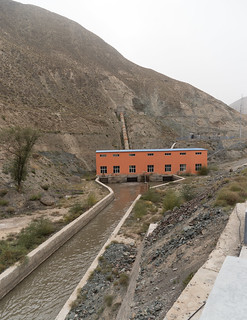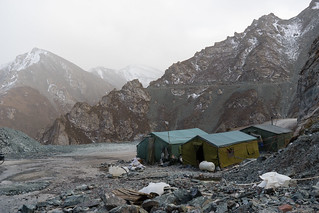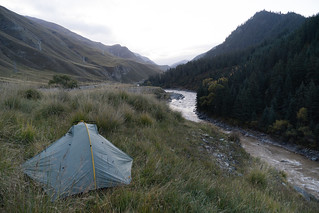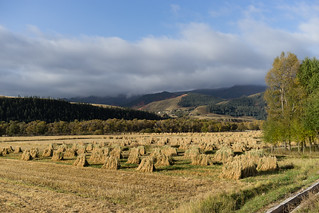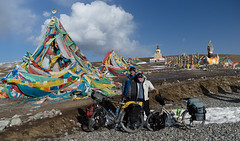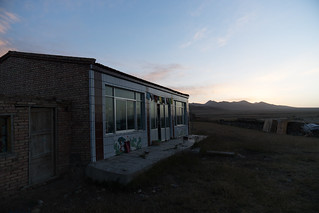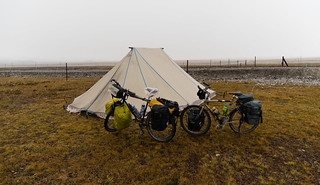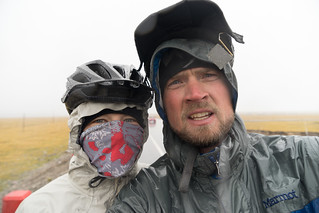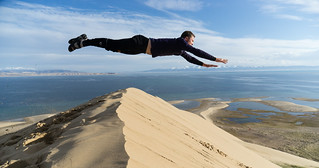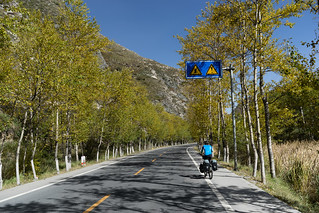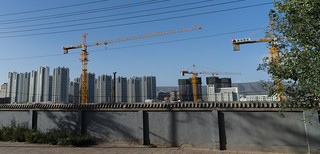After the bikes decided they’d had enough of independent travel and showed up in Zhangye (see our last entry on waiting for our bikes to arrive), we enjoyed a last evening with our friends and left town the next morning. Soon we were in a rural area where the street was lined with cornfields ready for harvest. For most of the day we followed the Liyuan River, and every half hour or so we passed a run of the river hydroelectric facility. I don’t think I’d ever seen such a hard working river. In between there were stretches that seemed free flowing, but then we’d encounter a small reservoir or pipe carrying water down from higher elevations. I’d like to learn more about this technology. It’s not new, but I don’t think I’ve ever seen it in the U.S. I’m curious about the environmental impact and cost per unit of energy generated, because at first glance it seems much less disruptive than the large dams and reservoirs I’m used to seeing.
In the afternoon, we started passing signs for the ‘Chinese Yugur Amorous Corridor’ (We assumed they meant ‘autonomous’ and not ‘amorous,’ although we were ready to be proved wrong). Paintings, statues, and banners along the road indicated that we were in a unique part of China. Shortly before sunset we found ourselves in the town of Sunan and decided to treat ourselves to a hotel, where we did some reading and learned that the Yugur people, rather than being particularly amorous, are in fact an ethnic group with their own autonomous county. According to Wikipedia, the Yugurs are descended from a group of Uyghurs (the most prevalent ethnic group in Xinjiang) that fled from Mongolia after the Uyghur Empire collapsed. The community around Sunan is Buddhist and speak a Turkic language. Sunan was a pleasant surprise – the Liyuan River runs through the town, and a riverside park is full of statues, people strolling in the evening, and neon lights illuminating the bridges after dark. We splurged on a hotel room for $20.
The next morning, just a few kilometers out of Sunan, the road turned to dirt and started climbing to the first pass of this leg of the journey. As we climbed, it got colder and we started encountering herds of yaks. Tibetan yaks are slightly different from the ones we saw in Tajikistan and Kyrgyzstan – slightly shaggier and, in my opinion, a little bit cuter. We were grateful for the extra clothes we’d bought at the night market in Zhangye. A while before sunset we came upon a series of what we think were mining camps. A Chinese cyclist we’d met in Kyrgyzstan had written a note in Chinese asking for a place to camp, and we showed it to a woman at one of the camps. She knew exactly what we needed, but instead of having us pitch our tent, they let us sleep in one of the small pre-fab buildings that lined the roads. They also made us dinner; at that point we had just learned how to say ‘want’ (‘yao’) and ‘have’ (‘you’) and we got them mixed up. Luckily, our language difficulties meant that one of the women cheerfully whipped up some egg and onion and we ate that with rice – much better than the instant noodles on the menu. We hung out with them all evening and practiced our Putonghua, and they taught us to count to 10. These were the first Chinese people we had actually spent time with since arriving in the country, and as I’ve noticed each time I cross a border, that first experience helps me feel a bit more welcome and at home in a country.
When we woke up, a light snow was falling and our new friends were worried about us, but we figured we could make it to the pass and get down to a lower elevation where it would be more comfortable. We were right, but the descent was extremely cold and our hands and feet kept freezing and we had to stop and do jumping jacks to warm ourselves up. On the other side, we found ourselves back in a Muslim town, and we stopped at a noodle shop for lunch. Everybody in the restaurant was curious about us and greeted us warmly before finishing their lunches and leaving. We ordered lunch, with the help of an app that screens characters and translates them, and we took pictures with the cheerful owners. However, before our food even arrived, two police officers came into the restaurant and sat down at our table. They didn’t speak much English, so one left and returned with the town’s English teacher. She delivered the bad news: we were in an area forbidden to foreigners and we must leave right away. They were quite nice about it, and we nodded our heads agreeably, scarfed our lunches, and left. We had asked them where exactly the ‘forbidden’ area was, but even with a map we couldn’t get a clear answer. So we decided to lay low as much as we could, meaning no attempts to stay in hotels or eat at restaurants, and a rushed trip into the next grocery store we encountered in order to stock up on food for the next few days. We also wore our buffs pulled up over our faces so nobody would guess we were foreigners. (We totally blended in.)
We rode out of town and into a canyon along the Heihe River, a tributary to the Yellow River. Leaves were starting to turn and yellow trees lined the river. Canyons are difficult to camp in, especially when you’re trying to hide, but eventually we found a spot, right before sunset, where we were hidden from the road. As we biked out of the river canyon the next day, we passed farms where people were cutting hay and stacking it in neat pyramids to dry. There must have been wild mint growing amid the hay, because the whole valley smelled fresh and delicious. It’s interesting to see how different places go about their farm work; in most of eastern Europe, hay was tossed onto a sharp stake sticking out of the ground, making Van Gogh-like haystacks. In the U.S., we bale it. In Tajikistan and Kyrgyzstan we saw it tossed onto roofs. In this part of China, it was gathered into bundles the width of a telephone pole, tied with another handful of hay, and propped up against another bundle in an upside down V. These V’s are arranged in rows supporting each other so the fields are dotted with what look like pup tents made out of hay.
We passed through Qilian in the late morning, wearing our ‘disguises’ and racing through the town in case we were still forbidden. In the middle of town we turned right, heading towards the mountain range we’d been paralleling all day. The road went up and up in a series of glorious switchbacks. We’d been climbing steadily since the day before, but it was well-graded and we made good progress. We reached the pass in the late afternoon and that was when we knew we were in Tibet. Prayer flags fluttered in rows up to a Chorten (stupa), and bundles of arrows (piercing through ignorance, I think) were plunged into the ground, with more prayer flags stretched between them. Incense was burning and prayer paper littered the ground. Groups of tourists, having been driven to the top, were posing next to a sign made in astroturf with the pass’s elevation – 4120m. We took the obligatory pictures and enjoyed the view, then headed down the other side.
Shortly before sunset we started looking for a place to camp but ran into a bit of a problem: In China, we’ve encountered a lot of barbed wire fencing, something we really haven’t seen anywhere else on this trip. We’ve been told and read that the government has been requiring the Tibetan nomads to settle, and in exchange for giving up their traditional lifestyle, the government provides a house and plot of land where they are expected to graze their animals. So it was difficult to find an accessible place to pitch our tent, and eventually we turned onto a side road and asked people we encountered if we could camp. This time, the note didn’t work at all – these people were Tibetan and spoke Amdo; like us, they couldn’t read Mandarin. So we resorted to hand signals, and a lovely couple in a tent that doubled as a store motioned to the land outside their tent where a flock of sheep were bedding down for the night. Before we even opened our panniers, though, they motioned for us to follow them across the road, where they unlocked one of the standard government houses and ushered us inside. From what we could tell, this was their house but they prefer the tent. It had three rooms and they let us stay in the main room where there was a wood stove and a kang, or raised platform where mats are rolled out in the evening for sleeping. They started a fire and gave us water to make dinner. In another room, there was what looked like a shrine, along with a sound system with big speakers (we’ve since seen this in all the Tibetan homes in the area) and a photo of Mao. Interesting.
We stayed with another family the following night, although under slightly different circumstances. We had crossed another, lower pass, and as we descended we noticed that we weren’t crossing any streams – the ground was wet and boggy, with muddy pools and no running water. It seemed to all seep into the ground as it ran down from the mountains. It was getting late, so we stopped to ask for water at a house off the road where an old Tibetan lady was standing outside. She smiled and invited us inside, where she and her daughter served us tea and fried bread. We thanked them and asked for water to cook with, and they offered hot water from a kettle – as we’ve since discovered, cold water isn’t really a thing in China (people are surprised that we want to drink cold water). At this point it was getting late enough that we needed to find a place to sleep soon, so we tried asking if we could camp. The note written in Chinese didn’t work, so we showed them a picture of our tent. They seemed to understand but we couldn’t quite tell if they’d given the OK, and then things got confusing. We went outside for a moment, and suddenly the older woman followed us out with the few items we’d brought inside, dumped them on the ground next to our bikes, and motioned for us to leave.
We’re not sure what was going on – the phone had rung a couple times while we were there, and a neighbor had come over, and we think somebody told them not to associate with us. We don’t know if we were still ‘forbidden’ there, but it’s possible that if they had been found with us in their house, they could have gotten in trouble. We felt awful for possibly putting them in that position, but also confused because they’d been so welcoming at first and invited us in when all we wanted was water. We were now in quite a bind because the sun had just set and we had no water and nowhere to sleep and didn’t feel like we should ask other people in the area for help. Plus, a storm was coming up behind us. So we rode on, hoping to find water and a spare patch of ground before the rain started. We’d biked about 15 minutes when a car pulled over just ahead of us. We stopped and when the man opened his door we asked about water. Without hesitation he poured the contents of his thermos into David’s water bottle. Half a liter of tea was nice but it wouldn’t get us very far… He was clearly worried about us and told us the next town was 40km away and that we should tie our bikes to the roof and get a ride with him. We thanked him but it would have been impossible, and we explained in our best Putonghua that we had a tent and just needed water. He thought for a minute and then pointed to a house down the road and motioned for us to follow him. He sped off and we almost lost him, but were able to follow him down a side road. By the time we got there he had a thermos in hand and was talking to the family.
Since we had a friendly translator, we showed him the note and he asked the family if we could camp there – we hoped that if it was risky for them they would say no. Instead, they readily agreed, and then we were able to have them talk to our friend on the phone, who told them that we had food and a tent and just needed cold water for cooking and a place to camp. After everything was fairly clear, our translator-friend left and the family invited us to sit down next to the fire. They served us a variation of tsampa (barley flour mixed with yak butter) and gave us hot water for our instant noodles. Then, they led us outside to their ‘guest yurt’ – a small canvas tent in the pasture, with a raised sleeping platform in the middle. As it was cold and gusty and still threatening rain, we were grateful to not have to set our tent up.
We woke up to snow and took our time getting ready, hoping it would let up. It showed no signs of stopping, thought, so eventually we forced ourselves to get up, say goodbye to our hosts, and ride into the snow. It kept up for a couple of hours, turning into rain as we descended to lower elevations, and all in all it was among the more miserable biking of the trip. Shortly before noon, though, the rain stopped and we were biking under blue skies. That afternoon, we passed by several coal mining or processing operations – trucks full of coal were coming and going and we could see some machinery, but most sites had tall blue fencing around them blocking a full view. In the afternoon, we were faced with a decision: continue on the same road, which was getting busier as we got closer to Xining, or take a slightly longer route on back roads past Qinghai Lake, the largest saltwater lake in China. You can probably guess which route we chose.
The back road was quiet, with only the occasional passing car, and before long we could see the lake on our right. We decided to be proper tourists and visit the Sand Island Scenic Area. We were pleasantly surprised – they let us ride our bikes out through the dunes to the lake, on paths lined with large sculptures made as part of an art festival hosted there. The lake itself was gorgeous – deep blue with a backdrop of snowcapped mountains reminiscent of Zorkul in Tajikistan – but the real highlight was the dune diving. We walked to the top of a dune and did our best to defy gravity. I think we’ve finally gotten all the sand out of our hair, ears and pockets… Of course we lingered too long, and by the time we left the park it was approaching sunset and another storm was brewing. We biked just a short distance until we came upon a cluster of abandoned buildings between the road and railroad tracks. They were surprisingly clean, and we enjoyed another night where we could cook under a roof and not have to set up the tent.
The next day was clear, and we focused on the remaining 130 km to Xining. It turned out to be a lovely ride, since a new expressway meant we could ride on the old highway with relatively little car traffic. First, we encountered dozens of Chinese tourists biking a circuit around Qinghai Lake. It was the first day of Golden Week, the national holiday, and everybody was on vacation. Then we continued on, following a river downstream nearly all the way. After a week at elevation, we were back in a milder climate and the beginning of fall. The hillsides on either side of the river were dotted with yellows, orange and red, and we could see pagodas on some of the hilltops. I felt like we were biking through a Chinese version of Vermont and it made me both homesick and content to be just where I was at that moment.
As we approached Xining, the road went through a series of industrial towns and the riding got less enjoyable. The air was full of dust and the roads were suddenly choked with large trucks, honking incessantly. We have a number of theories about honking behavior in China – are drivers taught to honk as a safety measure whenever other people or vehicles (or bikes) are around, just so we know they’re there? Did they not learn that they need to share the road, and they’re warning us to get out of their way? Trucks rarely slow down in populated areas – they just lean on the horn and barrel through. After awhile, the industrial towns gave way to what looked like entire brand new cities being built on the outskirts of Xining. Clusters of identical skyscrapers lined both sides of the roads, with cranes hovering above them, building away. According to one of the city’s residents, Xining’s population has quadrupled in the last decade, yet the new buildings don’t have tenants – they’re just standing empty. It was an odd feeling to so abruptly transition from grasslands and Tibetan nomads, to chaotic industrial towns, to empty tower blocks, and finally to Xining itself.







